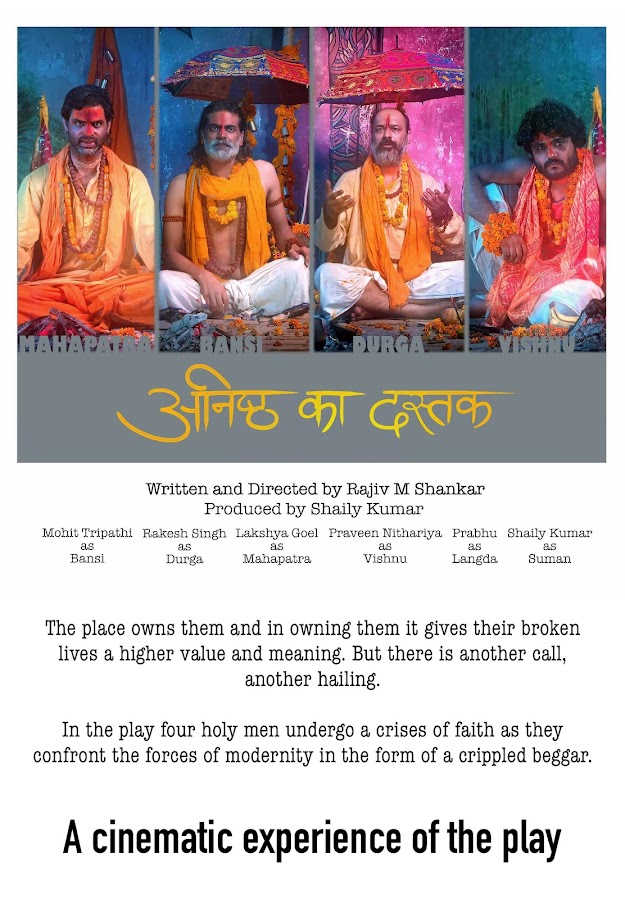About Rajiv Mudgal
Rajiv Mudgal
Author · Playwright · Filmmaker
Rajiv Mudgal is a writer and thinker whose work moves at the intersection of literature, philosophy, and civilizational thought. His essays and reflections engage deeply with questions of identity, reason, and being—drawing together strands from Indian metaphysics, Western philosophy, and modern political critique. Through a language that is at once lyrical and analytical, he explores how moral and metaphysical assumptions shape the architecture of our times.
Mudgal’s writings often traverse figures such as Dayananda, Aurobindo, Gandhi, Nehru, Ambedkar, Vivekananda, Savarkar, and Krishnamurti, placing them in conversation with modern thinkers like Heidegger and Jünger. His work probes how the spiritual and the political, the luminous and the rational, coexist and contend within the Indian imagination.
Beyond philosophy, Mudgal writes with a literary sensibility—his prose marked by rhythm, metaphor, and introspection. Whether dissecting the structures of Western rationalism or illuminating the metaphors of Kashi and Varanasi, he seeks to recover a language of insight that speaks both to the intellect and the inner life.
O Yasmeen… is Rajiv Mudgal’s second poetic novel — a meditative exploration of love, loss, and the subtle music of remembrance. It moves beyond the conventions of romance to inhabit a more elusive terrain, where memory becomes both a refuge and a revelation. Set against shifting landscapes — inner and outer — the novel traces the dialogue between longing and illumination, between the self that remembers and the self that awakens.
Yasmeen, the eponymous figure, is less a character than an invocation — a presence that threads through time, poetry, and silence. Through her, Mudgal reflects on the fragility of human connection and the metaphysical pulse that runs beneath everyday experience.
At its heart, O Yasmeen… is a work about seeing — seeing the world, the other, and oneself with a clarity that is at once painful and redemptive. It stands as a continuation of Mudgal’s broader literary journey: an inquiry into consciousness, beauty, and the mysterious thresholds where thought becomes emotion and love becomes understanding.
He is currently engaged in a series of essays examining the metaphysical foundations of modernity and the civilizational dialogue between India and the West, a project that continues his lifelong inquiry into what it means to think, to act, and to see rightly.
Selected Works
* देवताओं का मौन (Devtaon Ka Maun) (Hindi)
This book is described as a bold and dangerous journey into the living heart of non-dual Vedanta, written in an autobiographical style. It traces the essence of Vedanta through modern India, engaging with living masters to answer pressing spiritual questions about the "dweller and the dwelling" and the nature of truth.
* The Gods Have Gone Silent (English Translation)
A deeply contemplative and spiritually charged book, this work bridges ancient wisdom with contemporary struggles, serving as a spiritual guide to the essence of Vedanta. Set against India’s wilderness, mountains, and villages, it blends mysticism and realism to explore the enigmatic relationship between human struggles and the silence of higher powers.
* The Loom of Time: Stranger Than Fiction
In this novel, an ordinary man grappling with self-doubt is chosen for a mysterious journey to Moscow, where he meets influential intellectuals. Confronted with the harsh realities of Soviet collectivism, he eventually discovers a hidden library containing the "Loom of Time," an ancient, mystical machine that weaves the fabric of human history from the collective thoughts and actions of humanity.
* The Courtesan and The Saint
This collection of poems mirrors the "fractured echoes of time," reflecting on figures from 'Dushyant' and 'Shakuntala' to 'Draupadi' and 'The Spirit of The Machines'. The poems set the stage for a journey through the human condition, where legends like Dushyant, Shakuntala, Draupadi, the Courtesan, and the Saint converge in an ancient court to test the bounds of faith, love, and morality.
* Reflections In The River: Kālidāsa’s Letters To Dignāga
This work is a philosophical and literary dialogue that explores the nature of knowledge in a world shaped by Industrial intelligence and ecological fragmentation. It presents a fictional exchange between Kālidāsa, who champions the immediacy of poetic truth, and Dignāga, the Buddhist logician who insists that reality must be assembled through reason.
* O Yasmeen… (A Cartography of Grief)
Set against the backdrop of the Partition, this poetic novel is a profound exploration of loss, memory, love, and exile. The narrative unfolds in the mystical Chand’s Tea House, a sanctuary for broken souls that houses forgotten stories, where characters grapple with their own burdens of grief, violence, and betrayal.
* कुलप्रलय (Kulpralay) (Hindi)
This poetic epic reimagines the fall of the city of Dwarka, narrated by the divine city itself as it witnesses its own destruction. The story uncovers the interconnected tales of Shishupal and Shalva, two kings who, consumed by love, humiliation, and revenge, become the bearers of the final cataclysm.
Reflections in the River: A Clash of Knowing and the Crisis of Recognition




